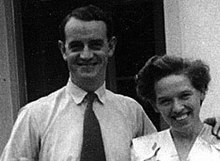Donald Sinclair (hotel owner)
| Donald Sinclair | |
|---|---|

Donald and Beatrice Sinclair
|
|
| Born |
Donald William Sinclair 6 July 1909 |
| Died | 1981 Torbay, Devonshire |
| Nationality | British |
| Occupation | Merchant Naval Officer, Naval Officer, Hotelier |
| Known for | Being the inspiration for the fictional character, Basil Fawlty |
| Spouse(s) | Beatrice Coutts Ritchie (1940–1981; his death) |
| Children | Two |
| Military career | |
| Allegiance |
|
| Service/branch |
|
| Years of service | 1939–1946 |
| Rank | Lieutenant commander |
| Battles/wars | |
Donald William Sinclair (10 July 1909 – 1981) was the co–proprietor of the Gleneagles Hotel in Torquay, England. He helped manage the hotel after an extensive career as an officer in the Merchant Navy and the Royal Navy. During World War II, he twice survived the sinking of the ship he was serving on.
He was the inspiration for the character Basil Fawlty in Fawlty Towers, owing to his allegedly stuffy, snobbish and eccentric treatment of his guests, including John Cleese and other members of the Monty Python cast.
Prior to World War II, Sinclair was in the British Merchant Navy. As an officer in the Royal Naval Reserve, he was called up in September 1939 for military service.
Soon after his call up, he joined the crew of the armed merchant cruiser (AMC) HMS Salopian.Salopian was a pre-war cargo liner that had been armed and converted into a warship as an emergency wartime measure. In May 1941 she was escorting a convoy in the North Atlantic. Early on the morning of the 13th, 400 miles south of Cape Farewell, Greenland, she was attacked unsuccessfully by the U-boat U-98 in heavy fog. During successive attacks in following six hours, Salopian was hit four times by torpedoes. Her engines were knocked out but she remained afloat and engaged the surfaced U-98 with gunfire. Salopian finally sank after a fifth torpedo broke her in half. All but three of the crew survived and were picked up the next day by the destroyers HMS Impulsive and HMS Icarus.
In July 1941, Sinclair joined the crew of the Infantry landing ship HMS Karanja. In May 1942, Karanja took part in Operation Ironclad, the British invasion of Vichy French-controlled Madagascar. In November 1942, she took part in Operation Torch, the Allied invasion of French North Africa. On the morning of 12 November, at Bougie, Algeria, Karanja was hit in the engine room by at least two bombs from a German Junkers 88 bomber and set on fire, before subsequently sinking.
...
Wikipedia
